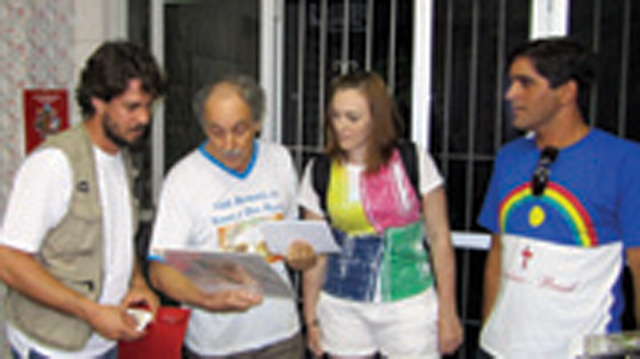Justice and Equality for all
By Kerrianne Ryan
January/February 2011
Return to Table of Contents
Print Article
We have all heard the phrase “Do as I say not as I do.” It seems hypocritical, but it is difficult at times to practice what you preach. Not only is this true of individuals, but it seems to me that perhaps our society (North American/Western/“Developed”) often falls into this same hypocrisy. In speaking to some members of Brazil’s growing middle class, they have the distinct feeling that we are trying to tell them what to do while we do not follow this advice ourselves. Some even feel that we may be trying to slow down their development because we fear they will overtake our position. We in Canada must strive to improve our practices for the global good if we are to expect other countries to do so, and if we expect them to accept our efforts to promote global sustainability and justice for the poor.
As a first time visitor to a nation of the global South, I had varying and conflicting expectations. Knowing Brazil to be a major player in the global market, I wondered at its need for global assistance to deal with extensive poverty. Spending time in the northeastern state of Pernambuco, it is abundantly evident that there is massive inequality. I can only imagine the level of inequality 25 years ago when the country was just emerging from a dictatorship that promoted the gap between the rich and the poor. Having been born and lived in Canada all my 26 years. I have no concept of the measures required to bring a society to a seemingly stable and relatively equitable economic position. I have grown up being taught not to repeat the mistakes of the past, always aware of how much of a mess successive generations continue to make through thoughtless exploitation of human and natural resources. Yet, here in Canada I have lived a comfortable life, arguably because of a lot of these so-called “mistakes.”
“The question for Canada, for Brazil, and for the world, is how do we continue the kind of development today that will create a just society for all and protect all life on the planet?”
On my travels and encounters in Pernambuco, I noted many similarities with my typical North American society. There were people jogging along the boardwalk in the mornings and playing games on the beach. I saw business types holding dinner meetings in sushi restaurants. I saw shopping malls, high rise buildings, public transit waiting in rush hour traffic. And I attended a youth orchestra concert at the church near our hotel. I also encountered extreme poverty. I learned of many struggles by indigenous peoples and the poor over land, resources, and services. I was appalled to hear of the inequality within the education system, lack of access to medical care, and the struggle for land rights.
 After our meeting, Kerrianne presents a gift to Fr. Herminio Canova, head of the northeast region’s Pastoral Land Commission (CPT) for the National Conference of Brazilian Catholic Bishops. At left is Junior who works for the CPT and was our guide during our visit to the Chico Mendes settlements. On the right is our hard working translator, Leo, wearing a T-shirt bearing the flag of Pernambuco. Leo accompanied our group throughout the 14 day trip.
After our meeting, Kerrianne presents a gift to Fr. Herminio Canova, head of the northeast region’s Pastoral Land Commission (CPT) for the National Conference of Brazilian Catholic Bishops. At left is Junior who works for the CPT and was our guide during our visit to the Chico Mendes settlements. On the right is our hard working translator, Leo, wearing a T-shirt bearing the flag of Pernambuco. Leo accompanied our group throughout the 14 day trip.Fr. Canova spoke to us about the issues concerning the landless poor. There is a clear choice for Brazil to make, he said. The country can either support an agricultural model that has people working their own plots of land, or it can choose to have no people in the fields. The option that will chase people from the land and into urban ghettos is the agribusiness model, producing vast quantities of a very few species of crops. Fr. Canova compares the people who work in this model to bagasse—the leftover pulp that remains after all the juice has been extracted from the sugarcane. The workers are simply a by-product whose life has been sucked out of them. The model that the CPT promotes is based on community life, collective ownership, respect for the land, diversity of crops and appropriate technology. “A new concept of land is needed,“ Fr. Canova says. “Land and culture must come together. From their coming together will emerge traditions, customs, models of production and consumption, and an integrated vision of nature.”
At the same time, I was encouraged to hear of the positive actions by the government including monetary education incentives for families to help keep children in school, investment in public housing, and movement toward land reform legislation, with some strong and innovative initiatives by many organ-izations including several of our Development and Peace partners. Over and over, I was involved in discussions about how development could and should be happening in a more sustainable way.
Canada is built on a model of exploiting our natural resources to build our economy, a practice that continues today. We live in a country where we use vast amounts of oil, natural gas and/or coal simply to heat our houses. While mistakes were made in the past, the question for Canada, for Brazil, and for the world, is how do we continue the kind of development today that will create a just society for all and protect all life on the planet?
As a young person, I am supposed to be hopeful for the future. Certainly, I see many initiatives for sustainable development and global cooperation. At universities all over the country, environmental studies and sustainability programs are being developed and implemented. The news frequently has stories about researchers from a variety of countries work ing together to solve environmental and social problems. Along with the challenges that come with globalization, there is the recognition that we cannot ignore the struggles of other nations.
At the same time I can empathize with the Brazilian government’s position of trying to advance their coun-try within the global community and understand how achieving this task in a short time is certainly easier to do in a less sustainable and thoughtful manner. I also see amazing groups present in places like Brazil fighting to right the wrongs of their country’s history and trying to hold their governments accountable to sustainability so as to bring about a better life for all. These groups are working to create a just society through cooperation, integration and innovation. They are an example to us.
We, as Canadians, must not only be good at charity, but also at transformational change. We must con-template how we can contribute to a positive global society both in what we can do as individuals, which is more than we think, and in what we can stop doing as individuals in order to promote justice and equality for all.
Kerrianne Ryan is a PhD student studying Neurobiology at Dalhousie University, Halifax. She is involved locally in Development and Peace and plans to extend her involvement within the international aid community based in part on her experience in Brazil.
Return to Table of Contents
Print Article
